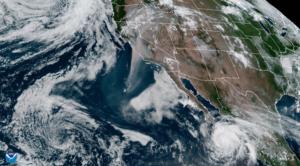 A group of NOAA-CREST research scientists and faculty affiliates kicked off the year 2015 by showcasing their globally significant research work at the recently concluded International Conference on Climate Change hosted by the historically and culturally rich city of Kathmandu – the capital of Nepal. The conference was sponsored by various organizations including the City College of New York, Colorado State University, and Small Earth Nepal, a non-governmental organization. NOAA-CREST was able to support the meeting thanks to funding received from the USAID Livestock-Climate Change Collaborative Research Support Program.
A group of NOAA-CREST research scientists and faculty affiliates kicked off the year 2015 by showcasing their globally significant research work at the recently concluded International Conference on Climate Change hosted by the historically and culturally rich city of Kathmandu – the capital of Nepal. The conference was sponsored by various organizations including the City College of New York, Colorado State University, and Small Earth Nepal, a non-governmental organization. NOAA-CREST was able to support the meeting thanks to funding received from the USAID Livestock-Climate Change Collaborative Research Support Program.
250 professionals and scientists from 27 countries attended the three day conference including five NOAA-CREST scientists who chaired some of the technical sessions and also presented their own research findings. The NOAA-CREST scientists included Tarendra Lakhankar, Nir Krakauer, Naresh Devineni, Balazs Fekete and Peter Romanov. It was a perfect meeting ground for professionals around the globe to deliberate, network and exchange meaningful scientific ideas, and discuss innovative and new emerging technologies that would help developing and under-developed parts of the world to combat various global and regional scale environmental challenges. Climate change is one of the most crucial global environmental and economic issues. The conference focused on how to address these climatic change issues especially in fragile and mountainous ecosystems and lowland parts of the South Asian Continent. These regions face extreme climate and weather related challenges, food security issues, water and soil management problems. The conference also addressed how to best support and augment the economic development of these fragile ecosystems and regions.
One of the major challenges discussed at the conference was the fact that there is a major dearth of remotely sensed as well as ground truthing data about Himalayan ecosystems. Two major factors contributing to data gaps include the lack of measurements, observations and a shared repository for data collected by various agencies. There are missing links between data producers and the data users. Planners and policy makers need historical data, prospective scenarios and expert interpretation of the data. The participating scientists emphasized that it is essential to establish a common data-sharing platform for planning climate resilient development strategies.
The highlight of the meeting was the panel discussion titled Future Directions to Meet Climate Change Challenges. Several prominent scientists including Dr. Madan Lall Shrestha, Nepal Academy of Science and Technology, Dr. Ajay Jha, Colorado State University, and Dr. Tek Bahadur Gurung, Nepal Agricultural Research Council led the panel. They emphasized the importance of developing drought and flood tolerant crops and livestock and called for more research to better understand the benefits of both. The key hurdle for many scientists is how to transition from research ideas to practice and understanding the adoption, diffusion and scalability of potential solutions. Scalability, diffusion and adoption should all be considered in the research and development phase. Collaboration and partnerships between scientists and NGOs can produce ideas for applicable research from the local community. Dr. Ajay Jha concluded the panel by highlighting the fundamental points – enhance community engagement in research; link research with application and commercialization; partner with the private sector, and collaborate on the development of data sharing platform for planning climate resilient development strategies. It was a great meeting that gave an opportunity for all the attendees including the zealous NOAA-CREST scientists to perceive the climate change problem with a different perspective.

